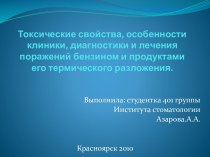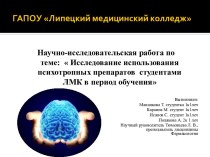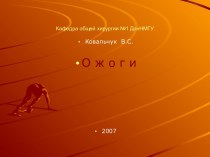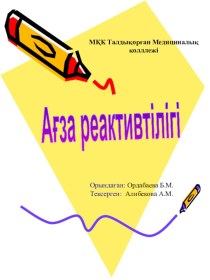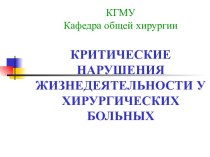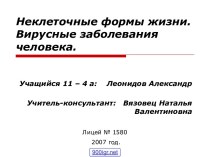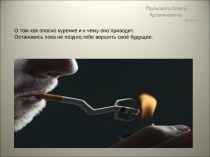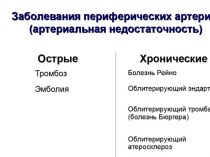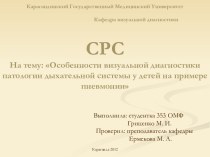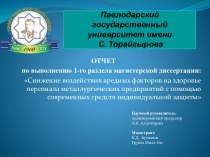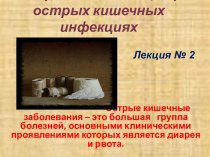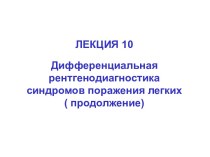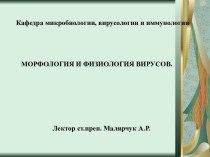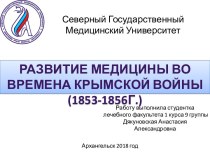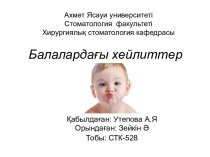- Главная
- Разное
- Бизнес и предпринимательство
- Образование
- Развлечения
- Государство
- Спорт
- Графика
- Культурология
- Еда и кулинария
- Лингвистика
- Религиоведение
- Черчение
- Физкультура
- ИЗО
- Психология
- Социология
- Английский язык
- Астрономия
- Алгебра
- Биология
- География
- Геометрия
- Детские презентации
- Информатика
- История
- Литература
- Маркетинг
- Математика
- Медицина
- Менеджмент
- Музыка
- МХК
- Немецкий язык
- ОБЖ
- Обществознание
- Окружающий мир
- Педагогика
- Русский язык
- Технология
- Физика
- Философия
- Химия
- Шаблоны, картинки для презентаций
- Экология
- Экономика
- Юриспруденция
Что такое findslide.org?
FindSlide.org - это сайт презентаций, докладов, шаблонов в формате PowerPoint.
Обратная связь
Email: Нажмите что бы посмотреть
Презентация на тему Narcology: evolution, definition, subject objectives and methods. Substance abuse treatment
Содержание
- 2. DEFINITION Lat.addictus – blindly loyal, addictedDependent (addictive)
- 3. Types of addictionCHEMICALNO CHEMICALPsychoactive substances (surfactants)- Substances
- 4. Psychoactive substances (surfactants)Alcoholany substance that meet the
- 5. DEFINITIONDrug addiction - a disease caused by
- 6. DEFINITIONPolydrug - simultaneous dependence on two or
- 7. ALCOHOLISM
- 8. Drug Addiction
- 9. SUBSTANCE ABUSE
- 10. DIGESTIVE ADDICTION
- 11. Classification of surfactants With sedation (alcohol, opiates,
- 12. The etiology of the dependencies1. Psychological causes:
- 13. The etiology of the dependencies2. Social reasons:•
- 14. The etiology of the dependencies3.The biological reasons
- 15. Dependency Clinic BIG Abuse SyndromeAbuse Big
- 16. DEPENDENCY CLINIC BIG ABUSE SYNDROMESyndrome of altered
- 17. DEPENDENCY CLINIC BIG ABUSE SYNDROMEPsychic dependence
- 18. DEPENDENCY CLINIC BIG ABUSE SYNDROMEPhysical dependence
- 19. STAGES OF ADDICTION I Stage of mental
- 20. The main stages of dependencestage 1Syndrome of
- 21. The main stages of dependencestage 2Syndrome of
- 22. The main stages of dependencestage 3Syndrome of
- 23. COMPLICATIONS COURSE DEPENDINGAFTER INTOXICATION SYNDROMEafter a single
- 24. COMPLICATIONS COURSE DEPENDINGABSTINENCE SYMPTOMSurfactant deficiency causes metabolic
- 25. Psychosis in surfactant consumptionALCOHOL - "metalkogolnye" -
- 26. Basic principles of treatment of substance abuse
- 27. The main types, techniques and tools? In
- 28. PSYCHOTHERAPYSuggestive methods (in Vol. H. Of placebo
- 29. Скачать презентацию
- 30. Похожие презентации
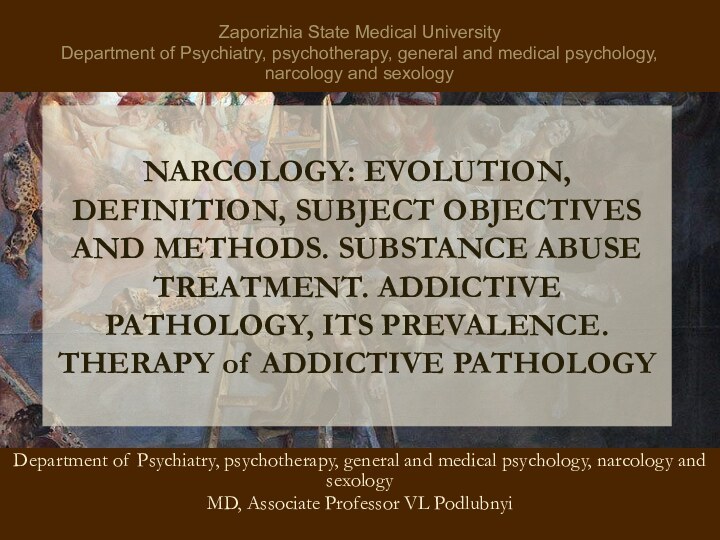
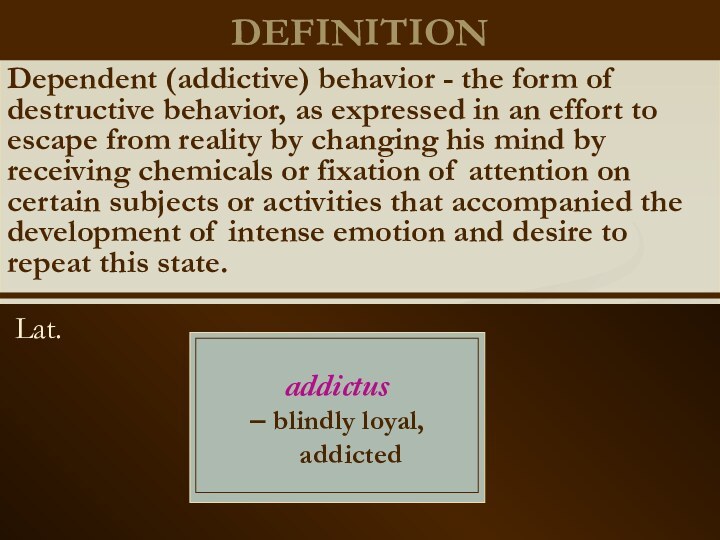
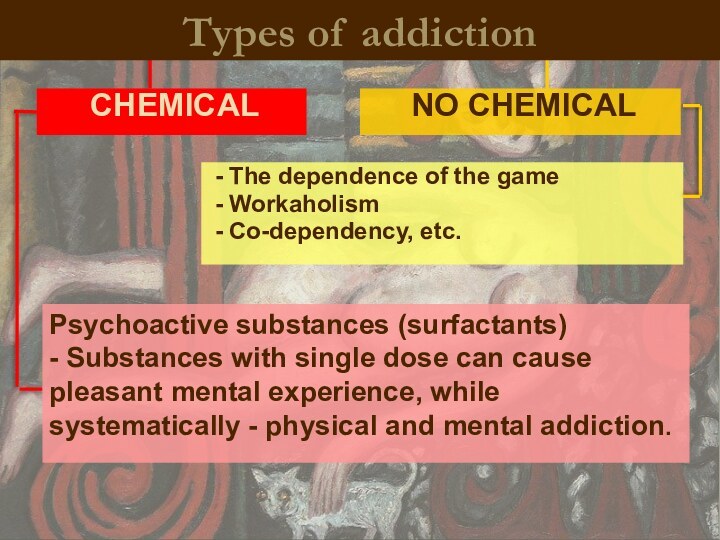
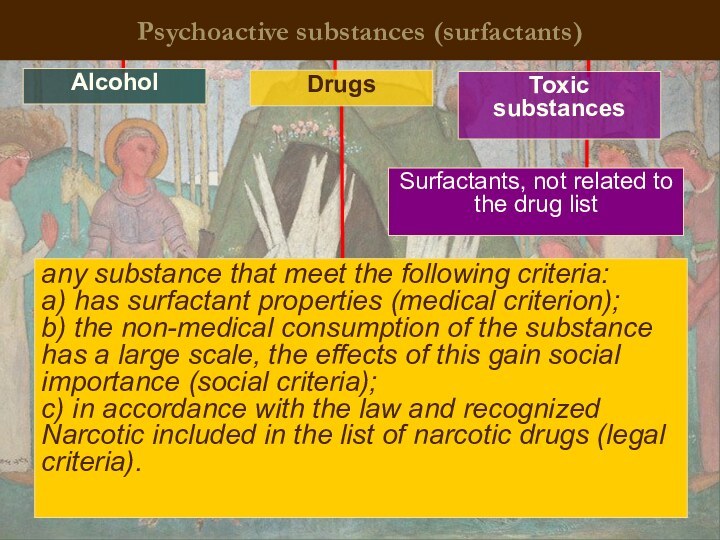
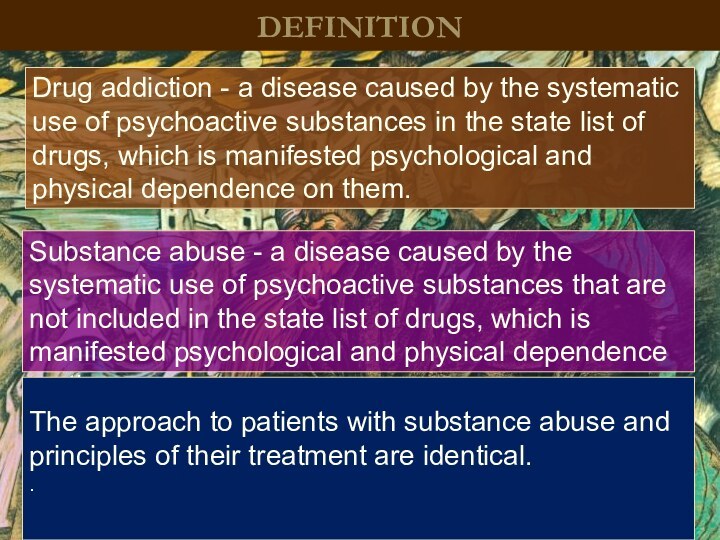
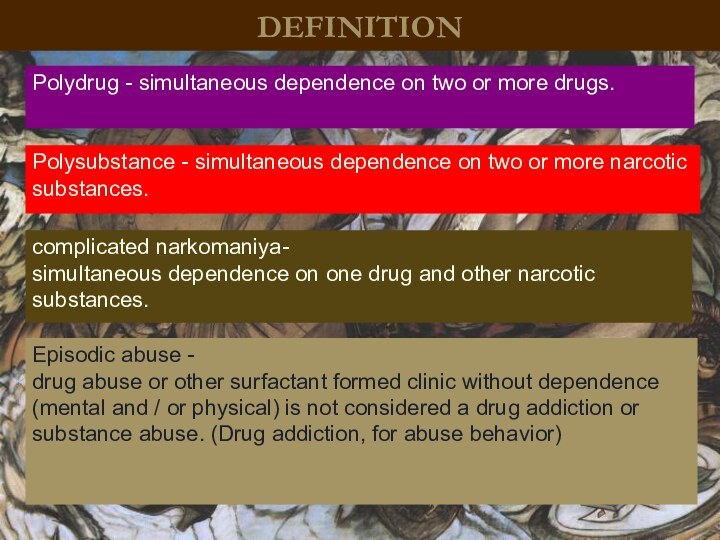
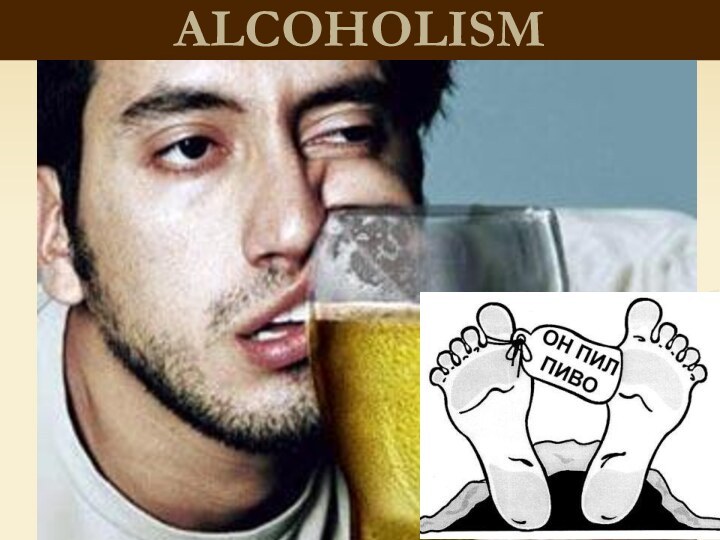
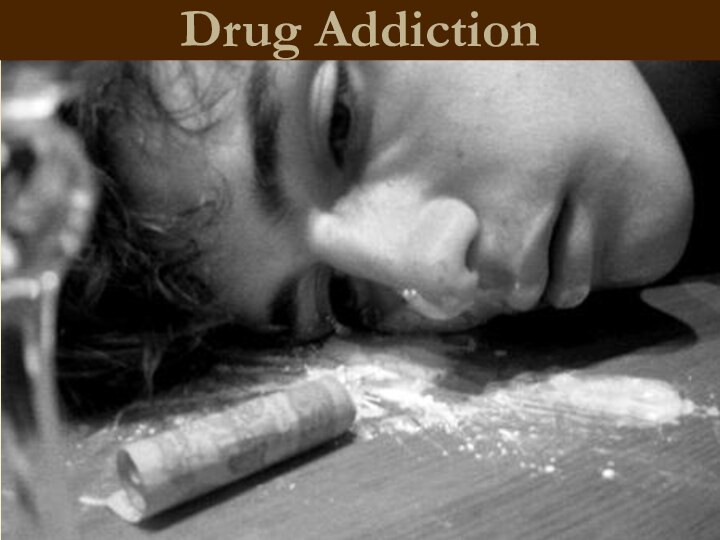
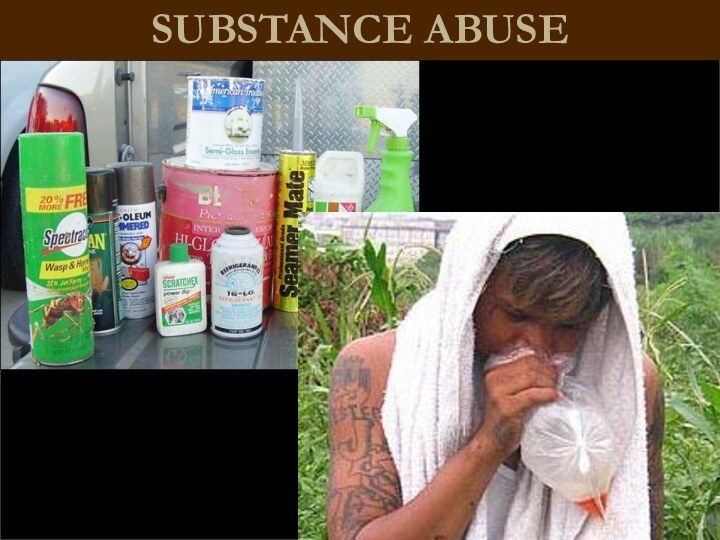

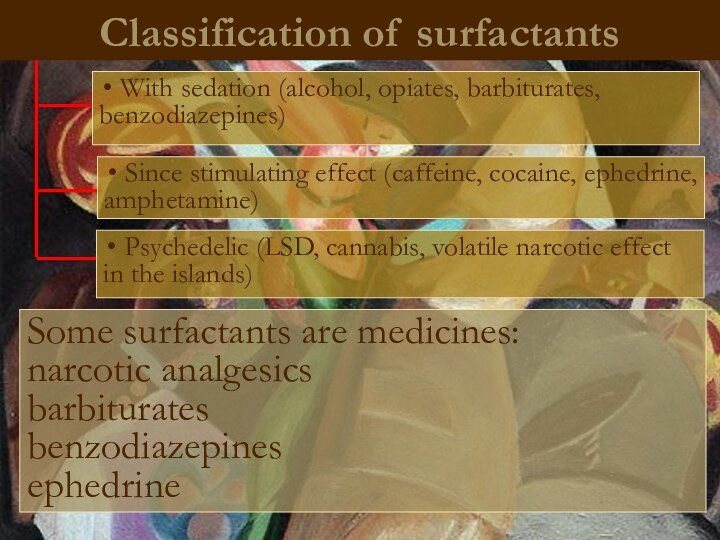
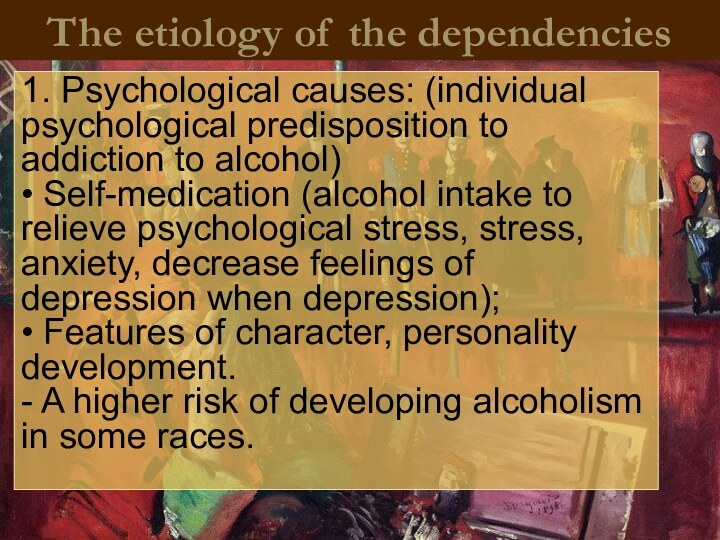
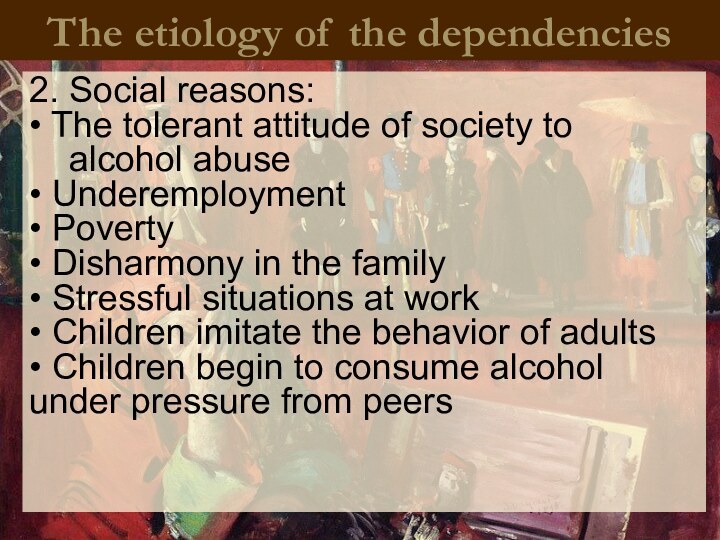
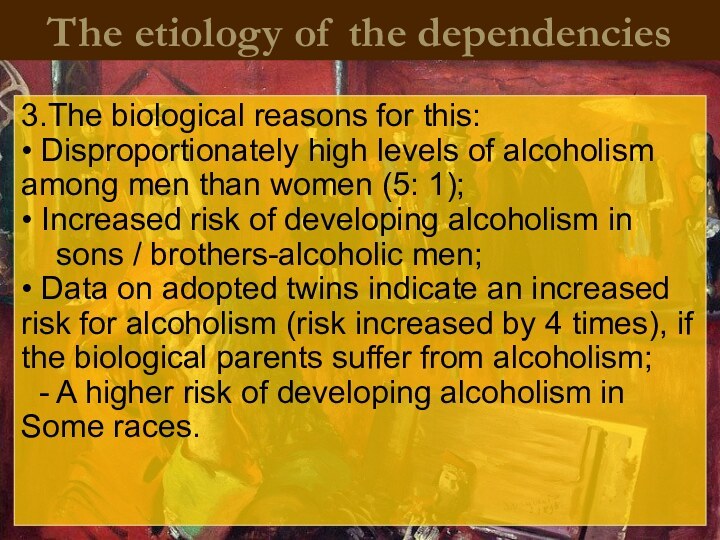
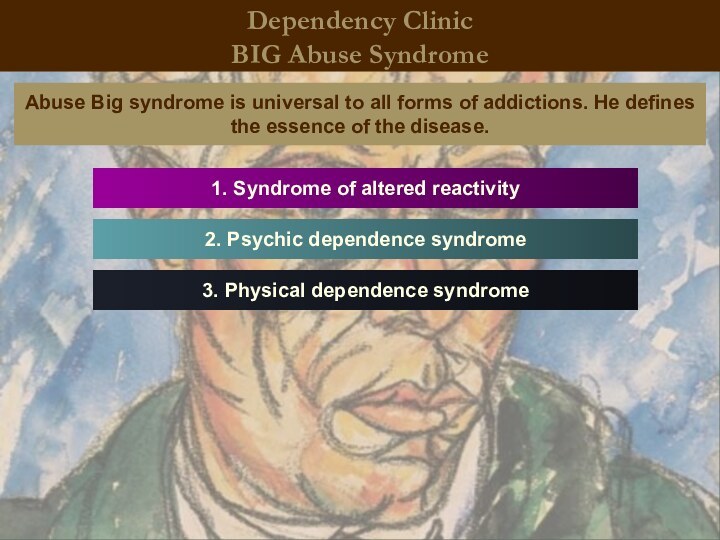
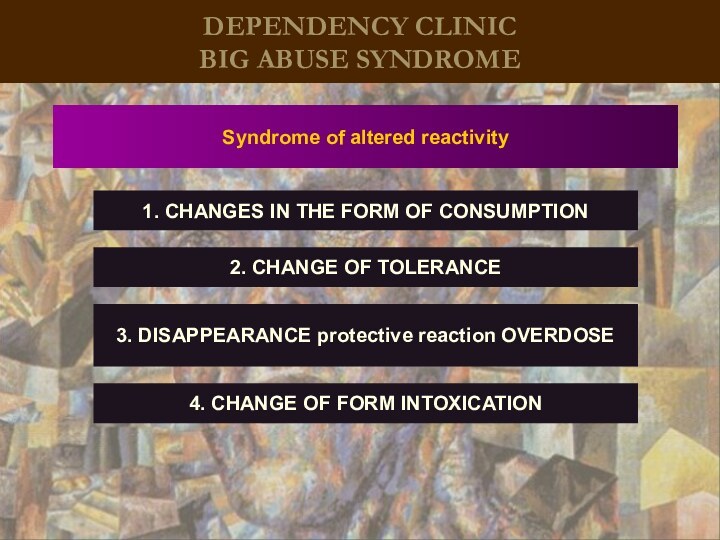
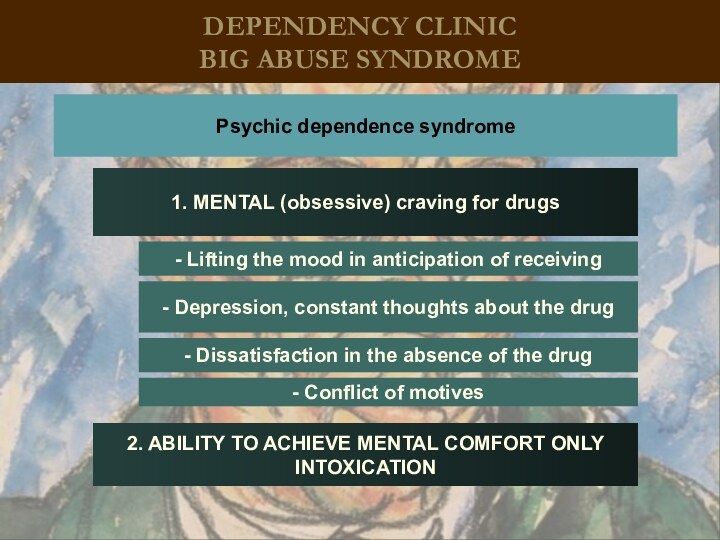
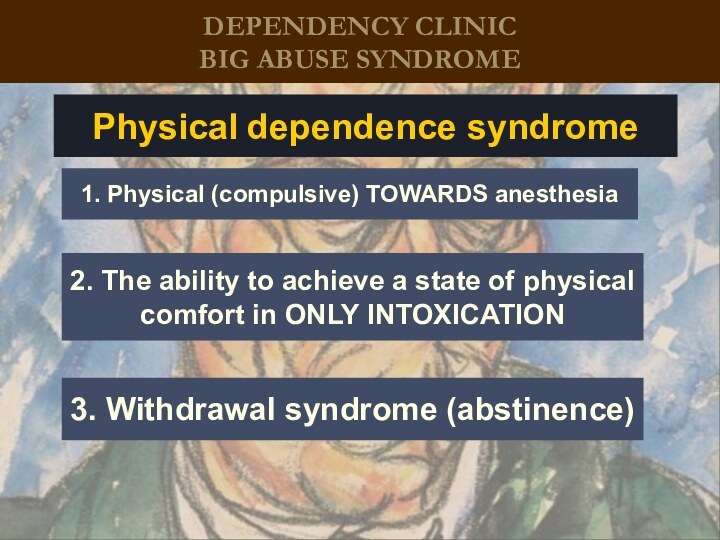
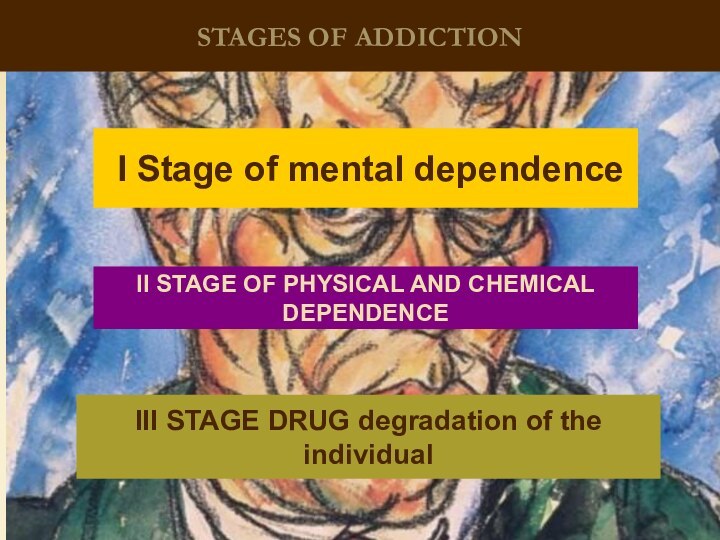
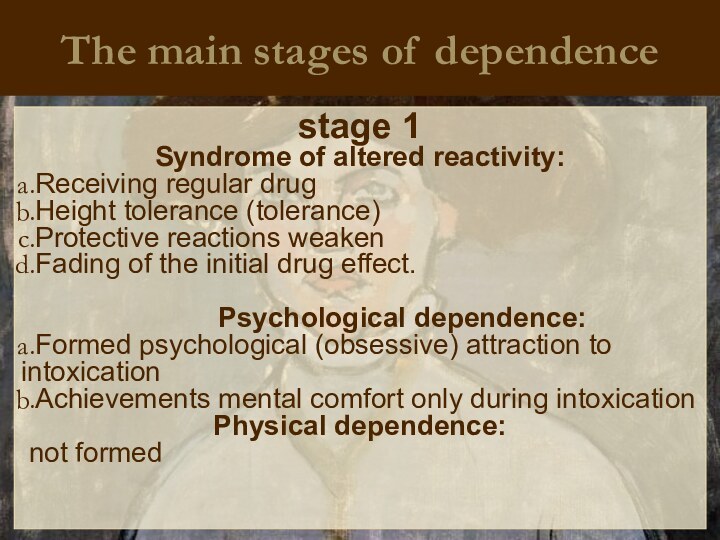
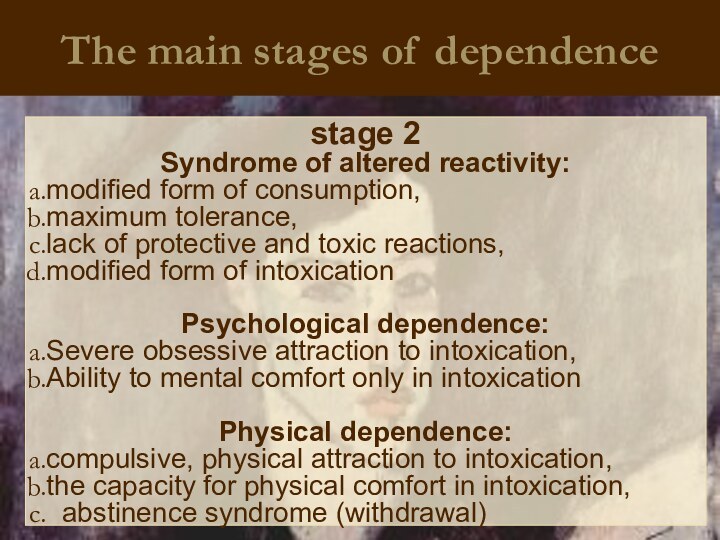
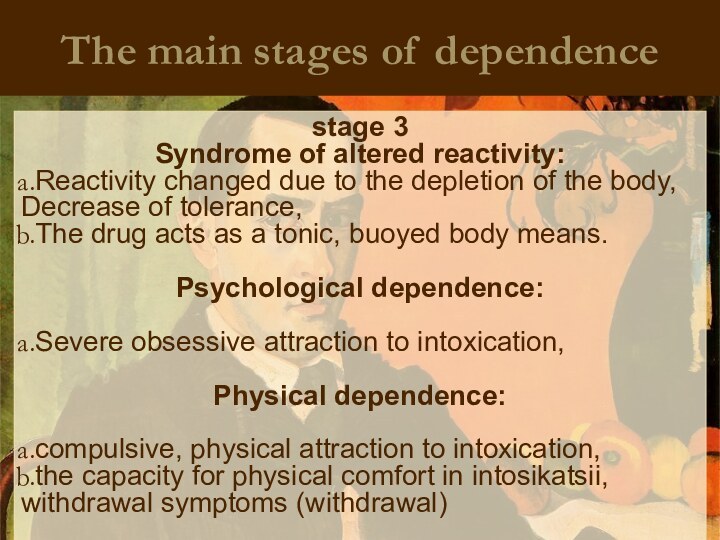
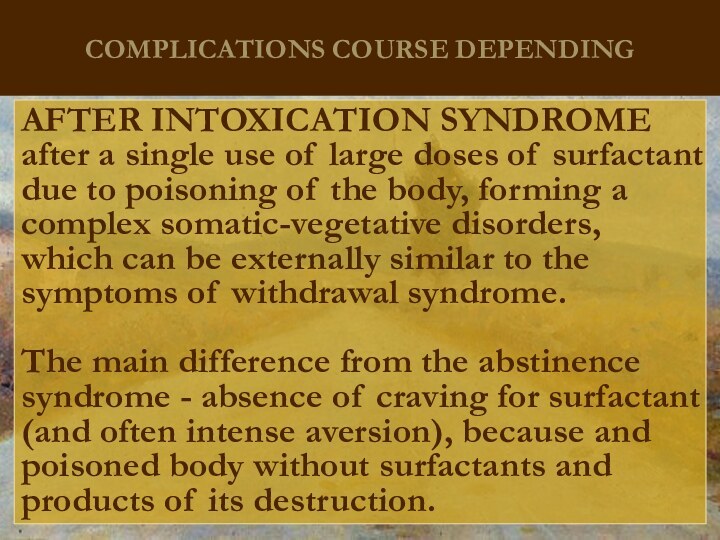
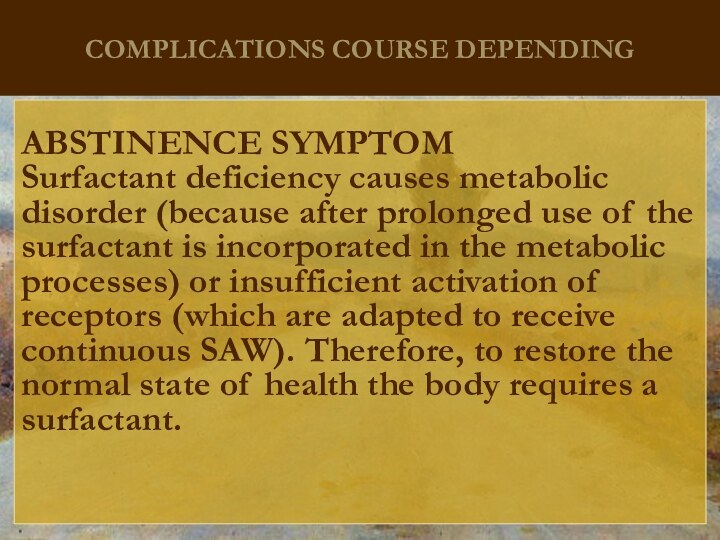
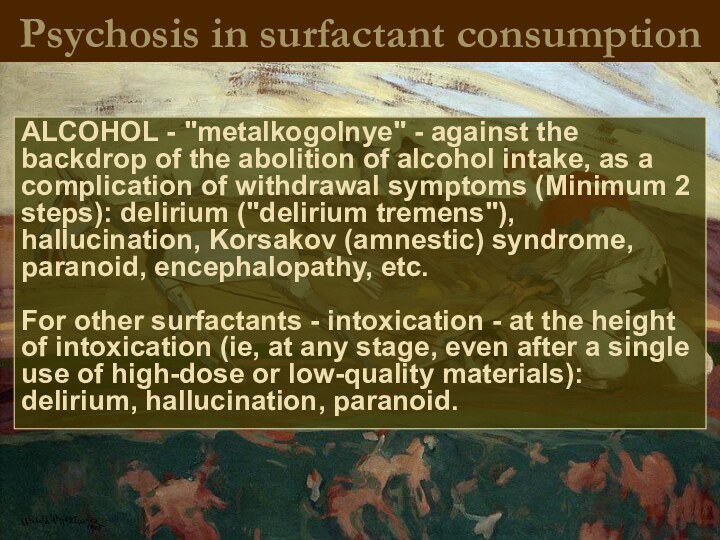
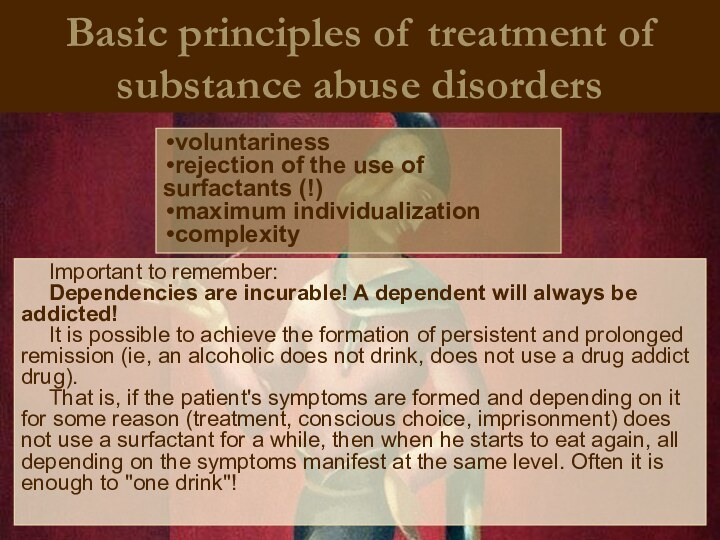
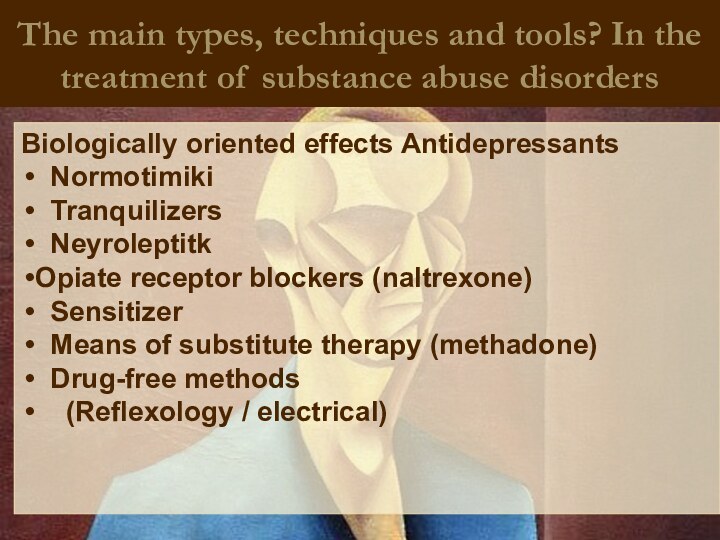
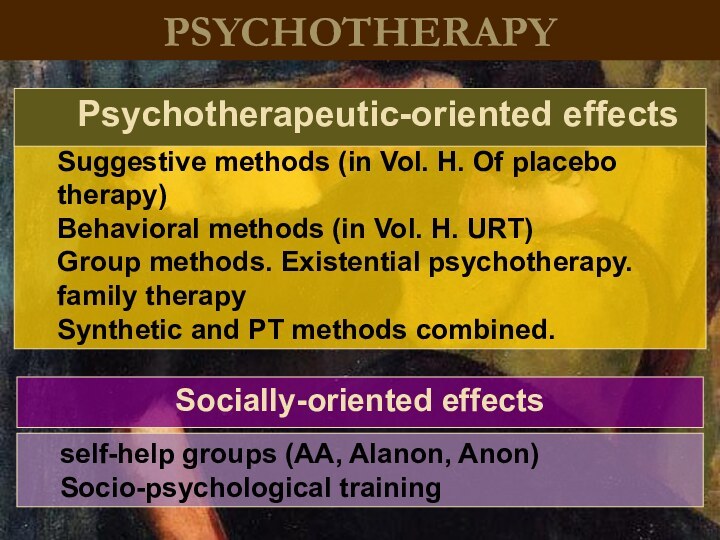
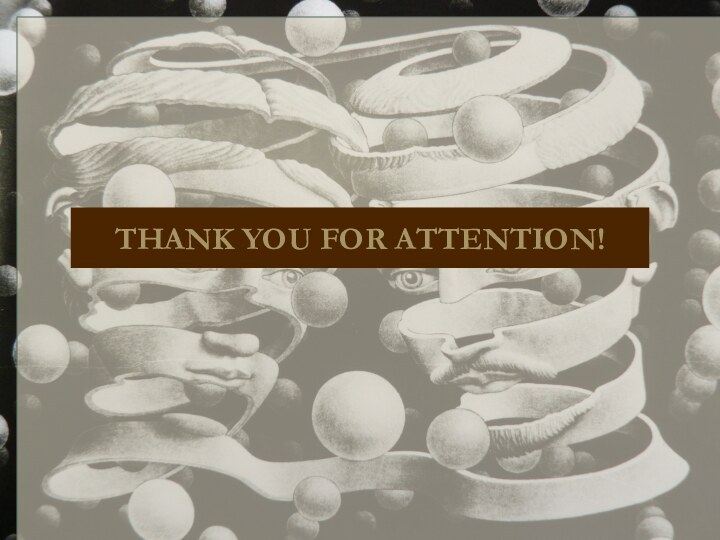
Слайд 3
Types of addiction
CHEMICAL
NO CHEMICAL
Psychoactive substances (surfactants)
- Substances with
single dose can cause pleasant mental experience, while systematically
- physical and mental addiction.- The dependence of the game
- Workaholism
- Co-dependency, etc.
Слайд 4
Psychoactive substances (surfactants)
Alcohol
any substance that meet the following
criteria:
a) has surfactant properties (medical criterion);
b) the non-medical consumption
of the substance has a large scale, the effects of this gain social importance (social criteria);c) in accordance with the law and recognized Narcotic included in the list of narcotic drugs (legal criteria).
Surfactants, not related to the drug list
Drugs
Toxic substances
Слайд 5
DEFINITION
Drug addiction - a disease caused by the
systematic use of psychoactive substances in the state list
of drugs, which is manifested psychological and physical dependence on them.Substance abuse - a disease caused by the systematic use of psychoactive substances that are not included in the state list of drugs, which is manifested psychological and physical dependence on them.
The approach to patients with substance abuse and principles of their treatment are identical.
.
Слайд 6
DEFINITION
Polydrug - simultaneous dependence on two or more
drugs.
Polysubstance - simultaneous dependence on two or more narcotic
substances.Episodic abuse -
drug abuse or other surfactant formed clinic without dependence (mental and / or physical) is not considered a drug addiction or substance abuse. (Drug addiction, for abuse behavior)
complicated narkomaniya-
simultaneous dependence on one drug and other narcotic substances.
Слайд 11
Classification of surfactants
With sedation (alcohol, opiates, barbiturates,
benzodiazepines)
Since stimulating effect (caffeine, cocaine, ephedrine, amphetamine)
Psychedelic
(LSD, cannabis, volatile narcotic effect in the islands)Some surfactants are medicines:
narcotic analgesics
barbiturates
benzodiazepines
ephedrine
Слайд 12
The etiology of the dependencies
1. Psychological causes: (individual
psychological predisposition to addiction to alcohol)
• Self-medication (alcohol intake
to relieve psychological stress, stress, anxiety, decrease feelings of depression when depression);• Features of character, personality development.
- A higher risk of developing alcoholism in some races.
Слайд 13
The etiology of the dependencies
2. Social reasons:
• The
tolerant attitude of society to
alcohol abuse
• Underemployment
• Poverty
•
Disharmony in the family• Stressful situations at work
• Children imitate the behavior of adults
• Children begin to consume alcohol under pressure from peers
Слайд 14
The etiology of the dependencies
3.The biological reasons for
this:
• Disproportionately high levels of alcoholism among men than
women (5: 1);• Increased risk of developing alcoholism in
sons / brothers-alcoholic men;
• Data on adopted twins indicate an increased risk for alcoholism (risk increased by 4 times), if the biological parents suffer from alcoholism;
- A higher risk of developing alcoholism in
Some races.
Слайд 15
Dependency Clinic
BIG Abuse Syndrome
Abuse Big syndrome is
universal to all forms of addictions. He defines the
essence of the disease.1. Syndrome of altered reactivity
2. Psychic dependence syndrome
3. Physical dependence syndrome
Слайд 16
DEPENDENCY CLINIC
BIG ABUSE SYNDROME
Syndrome of altered reactivity
1. CHANGES
IN THE FORM OF CONSUMPTION
2. CHANGE OF TOLERANCE
3. DISAPPEARANCE
protective reaction OVERDOSE4. CHANGE OF FORM INTOXICATION
Слайд 17
DEPENDENCY CLINIC
BIG ABUSE SYNDROME
Psychic dependence syndrome
1. MENTAL
(obsessive) craving for drugs
2. ABILITY TO ACHIEVE MENTAL COMFORT
ONLY INTOXICATION- Lifting the mood in anticipation of receiving
- Depression, constant thoughts about the drug
- Dissatisfaction in the absence of the drug
- Conflict of motives
Слайд 18
DEPENDENCY CLINIC
BIG ABUSE SYNDROME
Physical dependence syndrome
1. Physical
(compulsive) TOWARDS anesthesia
2. The ability to achieve a state
of physical comfort in ONLY INTOXICATION3. Withdrawal syndrome (abstinence)
Слайд 19
STAGES OF ADDICTION
I Stage of mental dependence
II
STAGE OF PHYSICAL AND CHEMICAL DEPENDENCE
III STAGE DRUG degradation
of the individual
Слайд 20
The main stages of dependence
stage 1
Syndrome of altered
reactivity:
Receiving regular drug
Height tolerance (tolerance)
Protective reactions weaken
Fading of the
initial drug effect. Psychological dependence:
Formed psychological (obsessive) attraction to intoxication
Achievements mental comfort only during intoxication
Physical dependence:
not formed
Слайд 21
The main stages of dependence
stage 2
Syndrome of altered
reactivity:
modified form of consumption,
maximum tolerance,
lack of protective and toxic
reactions,modified form of intoxication
Psychological dependence:
Severe obsessive attraction to intoxication,
Ability to mental comfort only in intoxication
Physical dependence:
compulsive, physical attraction to intoxication,
the capacity for physical comfort in intoxication,
abstinence syndrome (withdrawal)
Слайд 22
The main stages of dependence
stage 3
Syndrome of altered
reactivity:
Reactivity changed due to the depletion of the body,
Decrease of tolerance,The drug acts as a tonic, buoyed body means.
Psychological dependence:
Severe obsessive attraction to intoxication,
Physical dependence:
compulsive, physical attraction to intoxication,
the capacity for physical comfort in intosikatsii, withdrawal symptoms (withdrawal)
Слайд 23
COMPLICATIONS COURSE DEPENDING
AFTER INTOXICATION SYNDROME
after a single use
of large doses of surfactant due to poisoning of
the body, forming a complex somatic-vegetative disorders, which can be externally similar to the symptoms of withdrawal syndrome.The main difference from the abstinence syndrome - absence of craving for surfactant (and often intense aversion), because and poisoned body without surfactants and products of its destruction.
Слайд 24
COMPLICATIONS COURSE DEPENDING
ABSTINENCE SYMPTOM
Surfactant deficiency causes metabolic disorder
(because after prolonged use of the surfactant is incorporated
in the metabolic processes) or insufficient activation of receptors (which are adapted to receive continuous SAW). Therefore, to restore the normal state of health the body requires a surfactant.
Слайд 25
Psychosis in surfactant consumption
ALCOHOL - "metalkogolnye" - against
the backdrop of the abolition of alcohol intake, as
a complication of withdrawal symptoms (Minimum 2 steps): delirium ("delirium tremens"), hallucination, Korsakov (amnestic) syndrome, paranoid, encephalopathy, etc.For other surfactants - intoxication - at the height of intoxication (ie, at any stage, even after a single use of high-dose or low-quality materials): delirium, hallucination, paranoid.
Слайд 26
Basic principles of treatment of substance abuse disorders
Important
to remember:
Dependencies are incurable! A dependent will always be
addicted!It is possible to achieve the formation of persistent and prolonged remission (ie, an alcoholic does not drink, does not use a drug addict drug).
That is, if the patient's symptoms are formed and depending on it for some reason (treatment, conscious choice, imprisonment) does not use a surfactant for a while, then when he starts to eat again, all depending on the symptoms manifest at the same level. Often it is enough to "one drink"!
voluntariness
rejection of the use of surfactants (!)
maximum individualization
complexity
Слайд 27 The main types, techniques and tools? In the
treatment of substance abuse disorders
Biologically oriented effects Antidepressants
Normotimiki
TranquilizersNeyroleptitk
Opiate receptor blockers (naltrexone)
Sensitizer
Means of substitute therapy (methadone)
Drug-free methods
(Reflexology / electrical)
Слайд 28
PSYCHOTHERAPY
Suggestive methods (in Vol. H. Of placebo therapy)
Behavioral
methods (in Vol. H. URT)
Group methods. Existential psychotherapy. family
therapySynthetic and PT methods combined.
Socially-oriented effects
self-help groups (AA, Alanon, Anon)
Socio-psychological training
Psychotherapeutic-oriented effects


